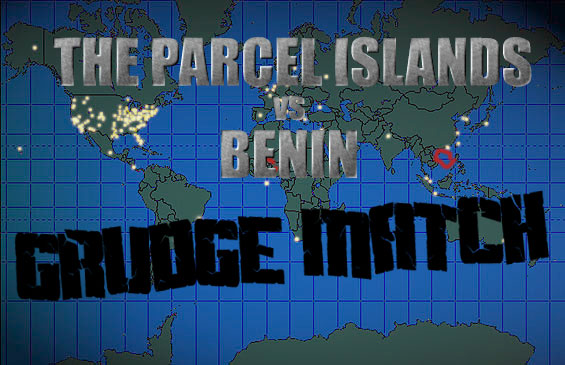Saturday, October 9. 4:34PM
The other day I was sitting down trawling the Internet, when to my delight I noticed that the CIA World Factbook, which ranks second or third on my list of handy internet resources, had undergone its yearly update. I thought about all that had happened in the last year, and looked up Iraq to see if they'd changed the government type, and sure enough, they had. It's now listed as "none." Hilarious!
But, you say, the CIA World Factbook does not a syndrome make. Oh ye of little faith.
I have decided to this week subject two randomly selected countries to a HYPOTHETICAL DEATHMATCH!
First step, I investigated the source of the CIA World Factbook and lifted a list of the nations of the world. I dumped it into a spreadsheet, and then headed over to random.org for a random selection. A true random selection, based on atmospheric noise, not one of these lame pseudo-random numbers my computer might give me.
They gave me 192 and 28…

The Parcel Islands aren't really that much of a country. They're basically a
series of coral reefs in the South China Sea. They were annexed by the French
in 1936 for a weather station, and remained controlled by Vietnam until 1974,
when they were invaded by China. At the moment, they're occupied by scattered
Chinese garrisons and a few fishermen. Taiwan also claims the islands as their
own, and wants to exploit the tourism opportunities (apparently, it's very beautiful
and there's a giant Buddha statue some place). China, however, says no, apparently
because they've buried quite a few top secret defense systems in the islands
to defend the South China Sea type approach.
Benin was also colonized by the French. They claimed it in 1872, and gave it independence in 1960. For those of you playing at home, Benin is that phallic shaped country in North-West Africa. It's between Niger, Nigeria, Togo, and my personal favorite country in the world, Burkina Faso. After 1960, Benin went through a series of military dictatorships until 1972, when they made the mandatory shift to something like communism. This lasted until 1989, when they finally pussied out, and made the switch to fragile democracy (the first African nation to successfully move from dictatorship to democracy). They've voted their communist leader back in now, but he's not so much of a commie any more.
Benin is involved in two semi-serious international disputes. First, they accuse Togo of moving the stones that mark the border between their two nations, depriving Benin of several villages. Second, they accuse Burkina Faso of moving the stones that mark the border between their two nations, depriving Benin of several villages. You'd think that it'd be this obsession with border stones that'd start the war with the Parcel Islands, but no, not quite. Benin, you see, has found an obscure paragraph in the Napoleonic Code (the basis of French Law, and also the legal system in Benin), which implies that a lapsed area of territory from a former French colony, can in fact legally be claimed by another Former French colony. They've been trying to mount the invasion of the Parcel Islands for decades, but have always met with one problem. It's impossible to paratroop troops into the Parcel Islands, because of the small land masses and likely hood of many of your soldiers hitting the water. Similarly, the one airstrip in the Parcel Islands is heavily fortified by the Chinese military. A land attack is equally out of the question, as you'd still have to cross the water to the islands themselves, and all the nearby countries have an interest in the islands themselves. The coast of Benin, however, is shallow and filled with sandbars, making a naval assault almost impossible… until now. Benin, you see, recently obtained a large amount of military hovercrafts, the ideal crafts for this situation.
There are about 1,671,194 Beninese of military service are, and fit for service. They don't have anything like the equipment for this kind of army, but with considerable military equipment, and some preparation time, it's not implausible for Benin to field and standing infantry army of around 600,000. These soldiers are equipped, trained, and mobilized, departing for the Parcel Islands on August 1st, 2005 - The Beninese National Day. It is at this time that the Beninese representative in the United Nations announces his nation's intention to invade the Parcel Islands, and declares war.
Immediately, the Chinese Military establishment goes into Crisis talks. China knows that it is a super power, and it knows that at some point it is going to have to go to war with the United States. Right now, however, China feels that it isn't ready for that conflict. It also knows, that were China to go to war over the Parcel Islands, Taiwan would be force to commit troops to defend what it sees as its territory. Taiwan is often referred to as 'that island off the coast of California), and China well knows that if they were to openly go to war with Taiwan, that the United States would soon follow. It cannot allow this to happen, and so, it is with a sense of regret that they telegram the commander of their garrison in the Parcel Islands and inform him that he is to hold the islands for as long as possible, but will not be re-enforced. The commander is a wily general, and he spends the 48 or so hours before the Beninese invasion force arrives digging in his troops and fortifying the islands.
On the third of August, the Beninese hovercrafts reach the first of the Parcel Islands, Triton Island. The find it undefended, and set up a small communications relay there. They spend the night in their hovercrafts, and at first light on the fourth, set out for the next island in the chain Passu Keah. Passu Keah is a considerably larger island, and seems to contain various built up military instillations (mostly anti-aircraft missile silos), but these have all been decommissioned. The Beninese commanders then divide their force in two, sending half to secure the Amphitrite Group of islands - a number of smaller islands that make up about half of the Parcel Island group. The other half of the force remains on Passu Keah, with the intention of beginning the assult on Duncan, Money and Robert Islands the next day - the ring of islands that surround the main island in the Parcel Islands - Pattle Island.
The airbase on Pattle island maintains a small wing of fighter aircraft, and very early on the morning of the fifth, these began to bomb the assembled Beninese hovercraft fleet. The comparative size of the six thousand or so hovercraft, and state of unreadiness that came from the easy victories that Benin had enjoyed so far made the Beninese army very susceptible to this form of attack. The hovercraft scrambled to begin their attack immediately, but nonetheless, the carnage was horrific. This did not stop as the craft began to approach Duncan Island, either, as the Chinese had remounted all their antiaircraft weaponry to fire over the water. The Chinese artillery and air support took a terrible cost on the advancing Beninese fleet. Even when their weight of numbers eventually enabled them to land on and take the island, larger howitzer artillery from Pattle island began to fire on Duncan island, not only taking a toll on the Beninese army, but also destroying Chinese fortifications (many of which had been rigged with explosives), making them unusable. Eventually, around noon the Beninese were forced to retreat to Passu Keah, their force less than one tenth the size it had been that morning.
On the other side of the island chain, however, the Beninese army had done much better. They had secured many of the smaller islands without resistance, and managed to secure the port facility on Woody Island with minimal casualties. Under cover of night on the fifth, most of what remained of the other half of the half regrouped to this facility. The Beninese Generals argued late into the night, but finally, the agreed on a plan.
All through the day of the fifth the Beninese army lay dormant. Many of the soldiers made use to the tropical sun to sleep on the beaches, and frolic in the water. Others cleaned their weapons, or help the few construction crews who were refortifying Woody Island. When night fell, however, things were different.
The fuel from the thousands of destroyed hovercraft from the previous days massacre had leaked out into the sea, and it only took one flare launched from a Beninese hovercraft to set the whole sea alight. The heat from this fire confused the Chinese night vision, and the sight of thousands of hovercraft comings out of the burning sea and black smoke was enough to unsettle the most battle worn Chinese Solider. Still, the final taking of Pattle Island was no cake walk for Benin. Battle Raged all through the night, and more than one hundred thousand Beninese lost their lives at to less than a thousands entrenched Chinese troops. At dawn, on top of the tower amidst the burning ruins of the airbase, the Commander in Chief of the Beninese Army pressed the barrel of his 9MM automatic to the forehead of the Chinese commander and fired, his limp corpse falling off the tower and onto the tarmac below. With victory his, the Beninese commander looked out at the sea, filled with floating corpses and burnt out hovercraft. He looked at the burnt and poisoned coral reefs and the thought of the tropical paradise he had just destroy. He fell to his knees and wept. "We have the Parcel Islands," he yelled. His next line was drowned out by the cheer from his solders at the foot of the tower, but one aide heard it.
"But at what cost."
And that, folks, is the story of how a West African nation came to possess an island chain in Southeastern Asia.
The Nubian Princess that follows is the 'mascot' for Benin's soccer team. Something like the head cheerleader. I'm not sure exactly what she does, as the site she came from was in Afrikaans, but she's the one that inspires them to victory. She'd inspire me to a thing or two.


